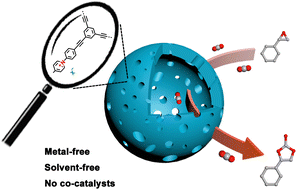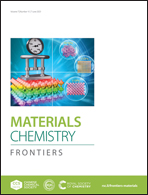A hollow viologen-based porous organic polymer for the catalytic cycloaddition of CO2†
Abstract
Converting CO2 into high value-added products such as cyclic carbonates can aid alleviation of the greenhouse effect because CO2 is a renewable C1 resource with high reserves. Benefiting from the two pyridinium rings as dicationic sites and free anions as nucleophilic substances, viologen-based porous organic polymers (VPOPs) have become important catalysts in the cycloaddition of CO2. We changed the micromorphology of VPOPs to obtain viologen-based porous organic polymers with a hollow-sphere structure (HVPOPs). Among the (H)VPOPs, HVPOP-Br exhibited high efficiency, reusable stability and substrate universality in the cycloaddition reactions of CO2 into cyclic carbonates. In a series of comparative experiments, the importance of microscopic morphology and anion of porous organic polymers in the cycloaddition reactions of CO2 was demonstrated.



 Please wait while we load your content...
Please wait while we load your content...